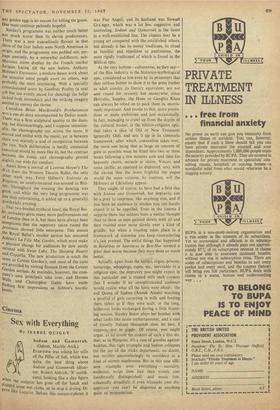Ballet
Golden Eggs
By CLIVE BARNES
HERE we are again bumping "L) against the Sunday Ballet Cl" and its difficulties. This is ,, u serial with the story up to 11°1, odrucesod over fivefivbealyleetasrs,shwoi being eleven programmes fifty London. Yet the crock of g°,...c awaiting the emergence of.a major choreogralwi., talent remains unclaimed. Will this twelfth e sode, played out at the Prince of Wales Theatre' introduce London to the missing hero? Will Borlsb ballet be transformed? Will Sunday Ballet CILI t gloriously justify itself? Sunday came and we11, and the answer was no; and so on, with 130°11° breath, to episode thirteen in a few months' tm: In a sense, Sunday Ballet Club needs no Insi.i fication. There must be some kind of outlet in Britain for new ballet, and without Sunday Bally( Club the prospect for an aspiring choreogran would be bleak. That this goose has not yet 131
THE SPECTATOR, NOVEMBER 30, any golden eggs is no reason for killing the goose. One must continue patiently hopeful.
Sunday's programme was neither much better nor much worse than its eleven predecessors. There was a new transatlantic flavour in that three of the four ballets were North American in origin, and the programme was padded out, per- haps unwisely, by a somewhat indifferent, sub- Marceau mime display by the French teacher Jacques Lecoq. Of the new ballets, Anthony Holmes's Encounter, a modern dance work about the stimulus some people exert on others, was Probably the most interesting. With a specially commissioned score by Geoffrey Pratley (a neat job but too evenly paced for dancing) the ballet lacked both immediacy and the striking imagery needed to convey the theme.
Canadian Brian Macdonald's Prothalamion was a pas de deux accompanied by Delius music. There was a firm sculptural quality to the danc- ing, but disconcertingly, and I suppose intention- ally, the choreography cut across the score. It started and ended with the music, yet in between there was scarcely a nod of recognition between the two. Such deliberation is hardly unmusical ,(amusical would be more like it), but the contrast between the music and choreography proved slightly too wide for comfort.
Apart from a revival of Laverne Meyer's The , Web from the Western Theatre Ballet, the only ,other work was Terry Gilbert's Sinfonia da Requiem, an overly-tortured run-around to Brit- ten. Throughout the evening the dancing was 'good, and while the very long programme was less than entertaining, it added up to a generally worthwhile evening. That two-headed mythical beast, the Royal Bat- \let, nowadays gives many more performances out Of London than in it, but there have always been 'complaints that the repertory taken round the provinces showed little enterprise. This season the Royal Ballet's smaller section has mounted Ashton's La File Mal. Gardee, which must make a pleasant change for audiences by now surely satiated with Swan Lake, The Sleeping Beauty and Coppelia. The new production is much the same as Covent Garden's, and most of the casts are provided by visiting firemen from the Covent Garden section. At matinees, however, the corn- PanY's own principals take over, and Doreen flashing and Christopher Gable have made uashing first impressions as Ashton's bucolic lovers.







































 Previous page
Previous page